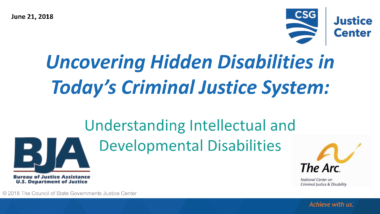Understanding Intellectual and Developmental Disabilities in People Involved with the Criminal Justice System
Hosted by the CSG Justice Center with funding support from the U.S. Department of Justice’s Bureau of Justice Assistance
The term “behavioral health” can be used to describe a number of presentations, symptoms, and needs. For example, the Diagnostic and Statistical Manual of Mental Disorders, Fifth Edition lists mental illnesses, intellectual/developmental disabilities (I/DD), substance use disorders, and personality disorders under this broad umbrella term. Though all classified as behavioral health issues, people with different diagnoses have different needs, especially when they are involved with the criminal justice system.
To navigate these needs, Leigh Ann Davis, director of the National Center on Criminal Justice & Disability, discusses differences and similarities between various kinds of behavioral health diagnoses and I/DD, how to identify someone with I/DD, and tips for to work more effectively with people with I/DD in correctional settings.
Find other events
You might also be interested in
The sharp rise in school shootings over the past 25 years has led school officials across the U.S.…
Read MoreA three-digit crisis line, 988, launched two years ago to supplement—not necessarily replace—911. Calling 988 simplifies access to…
Read MoreIt would hardly be controversial to expect an ambulance to arrive if someone called 911 for a physical…
Read More


















